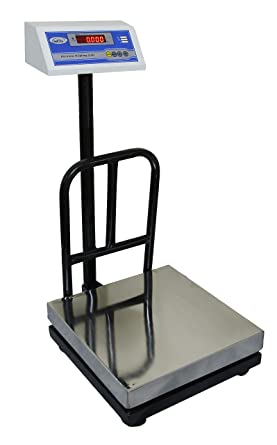The electronic weighing scale or digital weighing machine is an essential item. It helps in checking a product’s weight. However, without a weight machine, it is not possible to know the exact mass of anything. The electronic weighing system comprises the basic load cell, suitable signal conditioners, and output recorders/ indicators. And they give both the analog and digital output for further processing. Generally, a signal from the load cell amplified and to analog/digital converter. Then it provides an output in the digital format for display/ printing/processing etc. Almost every industry like retail, manufacturing, laboratory, jewellery, food processing, healthcare, courier companies use the electronic weighing scale.
ELECTRONIC WEIGHING SCALE MARKET OPPORTUNITY
Now a day the demand of digital weighing machine is increasing day by day in most of the business enterprises. Because measuring the weight with a digital weighing machine is user-friendly with a variety of various applications. Furthermore, there is a constant need for knowing the exact weight of many items, e.g., food, ingredients for production, pharmacology, chemistry, technology, etc. Therefore, rapid industrialization is the main driver of the growth of the electronic weighing scale market. Some of the advantages of digital weighing machine are
● Compactness and small size independent of capacity.
● A high speed of response and rapid weighing.
● Good accuracy.
● Excellent flexibility to monitor multiple loads.
● Finally, online processing through the computer.
The trends of weighing scale increases towards higher accuracy and lower cost production. It will increase the demand of high-performance analog signal processing at low cost.
DIFFERENT USAGE OF ELECTRONIC WEIGHING SCALE
● First of all, Table top/ Retail scales Weighing scales with platforms for retail stores 30 kg. 5 gm.
● Bench scales Weighing scales for chemical industries, wholesalers, grain merchants, all types of industries 1 ton 10 gm.
● Jewellery scales High precision / low capacity weighing scales for weighing precious metals 500 gm. 0.01 gm.
● Analytical scales High precision / low capacity weighing scales for laboratory application 200 gm. 0.01 gm.
● Digital weighing scale in healthcare industry.
● Industrial Platform scales High capacity weighing scales for high volume weighing such as metals, industrial raw materials. And they have an industrial output of 5 ton 100 gm.
● Hanging scales Heavy duty weighing scales for field weighing 1 ton 10 gm.
● Finally, weighbridges Heavy duty weighing and rugged electronic weighing scales for truck weighing at industries, warehouses and transportation depots. capacity is 60 ton 10 kg. The heavy-duty electronic weighing scales such as industrial platform scales and weighbridges use a 4 load cell bridge technique.
ELECTRONIC WEIGHING SCALE MANUFACTURING BUSINESS COMPLIANCE
In starting this business, you must apply for different registrations and licenses from the Govt. authority. However, it is advisable to check your state law.
● First of all, register your business with ROC. This is mandatory.
● Apply for Trade License from local Municipal Authority.
● Furthermore, apply for MSME Udyog Aadhaar online registration for small and medium unit operation
● In addition, apply for BIS certification for ISI Mark. You must maintain the quality standard IS : 2281/1981
● In this business, you must obtain ‘NOC’ from Pollution Control Board. Firstly, apply for ‘Consent to Establish’ and then apply for ‘Consent to Operate’.
● The quality and process, both are important in this business. The ISO 9000 defines standards
● for Quality Management Systems and ISO 14001 defines standards for Environmental
● Management System for acceptability at international level. Therefore, you may adopt these standards for global competition.
● In addition, apply for VAT Registration.
● Finally, protect your brand name with Trademark Registration.
MACHINERY FOR ELECTRONIC WEIGHING SCALE MANUFACTURING
You will need to procure some of the basic machinery and equipment for this business. These are
● Bench Drilling machine
● Digital Multi Meter
● Oscilloscope (0-20 MHz)
● IC Tester/EPROM Programmer
● Digital LCR Meter
● Load Cell Simulator
● Portable Grinder
● Standard Weights Brass
● Multi-meter (Analog)
● UV Eraser etc.
In addition, you will need to arrange utilities like water and electricity. Furthermore, a medium and large scale unit demand 2000 Sq M area for the operation.
REQUIRED RAW MATERIALS
You must procure different quality raw materials. However, some of them are available from import only.
● Cabinet/Housing (Metal)
● Capacitors
● Fluorescent display
● Integrated circuits
● Load cell (strain gauge)
● Mechanical hardware
● Noise filter
● PCB
● Rectifier
● Resistors (Diodes and switches)
● Transformer
● Transistors
● Finally, some Wires, cable connectors, consumables and packing material etc.
ELECTRONIC WEIGHING MANUFACTURING PROCESS
The manufacturing process involves the assembly of the load cell, electronic circuits, and electromechanical hardware. Subsequently, you will need to assemble the electronics assembly the ICs, transistor, diodes, resistors, capacitors transformer, coils, relays, potentiometers on PCBs. However, you must do it as per the design.
Then you will need to test the assembled PCBs for performance. Subsequently the electronics assembly along with electromechanical assembly. Also, you will need to test the hardware such as connectors/switches, terminals display etc. Finally, the assembled unit is calibrated and tested as per the design specification.
QUALITY & STANDARD
The International Organisation of Legal Metrology (OIML) standards R 60 and R 76 are the most widely followed by the manufacturers of load cells. In addition, the certification ensures that their products meet international specifications for metrological performance and testing. However, the key success factor for this project would be the after-sales service network


